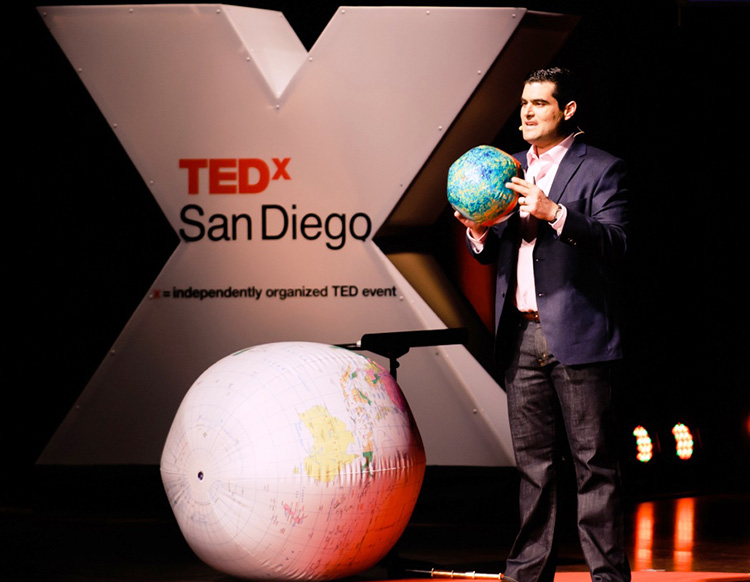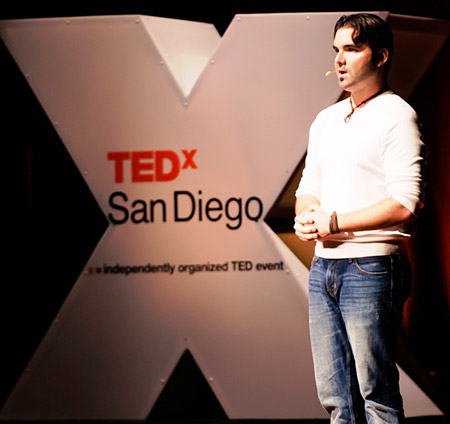
By:
- John B.B. Freeman
Published Date
By:
- John B.B. Freeman
Share This:

Brian Keating. Photo by Paul Douda Photography
Researchers Energize TEDxSan Diego with Talks on Origins of Universe and Psychology of Passion
Marking the 450th anniversary of astronomer Galileo’s birth, UC San Diego astrophysicist Brian Keating took center stage at TEDxSan Diego on Nov. 8 as he outlined his team’s epic research—trying to unravel the origins of the universe.
Known as POLARBEAR, the study involves peering skyward with space-age instruments from cold, distant locales in Chile’s Atacama desert and in Antarctica, or more precisely, the South Pole, “the coldest, driest, highest continent on earth, ideal for obtaining images of the distant universe.”
“What we’re trying to do,” Keating said, “is uncover what the universe looked like a trillionth of a trillionth of a trillionth of a second after the Big Bang”— dating back 13.8 billion years.
Adhering to the TEDx format, Keating’s talk lasted some 10 minutes, but he fully energized the rapt audience of some 1,200 with insight, intrigue, and flashes of humor.
Last March, Keating announced that his team had detected traces of the “Big Bang” that created the universe, based on trace remnants from the explosion. Results of the 13-year study have received wide scientific acclaim.

Bradley Voytek
The five-hour TEDx event, co-sponsored by UC San Diego Extension, also featured UC San Diego neuroscientist Bradley Voytek, who spoke about “the psychology of passion—obsessive and harmonious.”
Voytek and Keating were among 15 speakers who TEDx’ed their way through such diverse topics as classical music, science, motivation, innovation, Guinness-record planking, opera, ballet, ethics, and the power of chutzpah.
As Keating spoke, the project’s “swirling, twisting, curling” visual images were illuminated on a video screen behind him. “Think of it as the earliest possible photograph that you could possibly take, the very birth of the universe,” he said. “It’s as if you were an omniscient deity, looking down on our universe. This is the pattern you would see.”
He compared the images, captured by an ultra-sophisticated telescope, to a blastocyst—the cluster of several hundred cells formed shortly after conception in humans and other mammals.
“This collection represents the human embryo roughly 1,000 seconds after conception—1,000 seconds after your own personal big bang,” he said to laughter.
Keating cautioned that the origins of the universe may not be fully unveiled until—or unless—our universe collides with one or more “other” infinite universes.
With that, a dozen or so small inflated beach balls suddenly descended into the audience. At the same time, Keating flung one unusually large ball to represent the known universe.
“Let’s see if any of these collide,” said Keating. As the balls careened around the hall amid shrieks of delight, he wondered aloud: “What would Galileo, my hero, have to say about all this?”
Voytek told the “unlikely” story of how he became a neurophysicist with a certain distinction.
“As of 2012, when I was still a post-doctorate fellow, the number of Native American post-doctorate fellows with Ph.d.’s was (pause) … me,” he said.
Raised in a self-described working-class family, he recalled the time at age 8 when he first told his father he wanted to be an astrophysicist. “He said, ‘I don’t know what that is, but that’s fantastic.’”
Voytek, who began a tenure-track position this semester at UC San Diego’s department of cognitive science, touched only briefly on his new-found status as a zombie expert, choosing instead to recall his early academic struggles.
“I was a terrible student, a failure as an undergraduate (at USC),” he said. “My grades were so bad that I lost my scholarship, which made me say, ‘Well, what do we do now?’ ”
Duly inspired by Stephen Hawking’s A Brief History of Time, which “changed my life and inspired in me to find my passion” through the study of passion, Voytek, 33, got his academic career back on track with “a lot of hard work.” He earned his Ph.D. in neuroscience from UC Berkeley in 2010, with an emphasis on the role of neuroplasticity in human cognition.
He urged the audience to encourage and be patient with those whom, like himself, he euphemistically dubbed as “screw-ups with potential.”
Share This:
You May Also Like
Stay in the Know
Keep up with all the latest from UC San Diego. Subscribe to the newsletter today.


